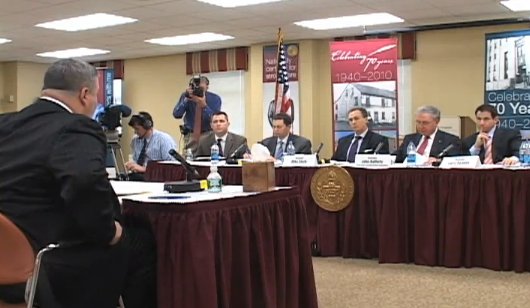State Transportation Committee holds public hit-and-run hearing at Nazareth Hospital.

Senators, advocates and victims packed the Marian Hall Conference Center inside Nazareth Hospital yesterday morning to unite for a common cause. The hearing, hosted by Sen. Mike Stack and Sen. John C. Rafferty, chairman of the Senate Transportation Committee, discussed hit-and-run accidents in the Northeast.
The hearing was used to formally introduce senate bills that would toughen and increase the penalties for hit-and-run drivers who flee the scene of an accident that results in injury or death.
“The tougher penalties will help deter people from fleeing an accident,” Stack said.
Bill breakdown
Four bills were introduced at the hearing, all of which would stiffen penalties for hit-and-run accidents.
Bill 522: If a victim suffers serious bodily injury, the penalty would increase from a 90-day minimum prison sentence to a minimum of two years’ jail time. If the victim dies, the penalty would go from a minimum of one year to five years.
Bill 1177: If a victim suffers serious bodily harm, the penalty would increase from a 90-day minimum prison sentence to one year in jail with a $10,000 fine. The minimum of one year to two years in prison plus a $20,000 fine would be the case in the event the victim died.
Bill 1049: In the result of the victim dying, increase the mandatory prison sentence from one year to at least three years if drugs or alcohol were involved in the accident.
Bill 1267: Introduced by Sen. Larry Farnese, “does a lot of the same things but it differs slightly in that it upgrades all charges to felonies.”
A panel of guests spoke at the hearing, giving their perspectives on hit-and-run accidents in the Northeast.
First to speak was Dr. Bryce Templeton, national board member of Mothers Against Drunk Driving and the chair of the Southeastern MADD chapter. Templeton pleaded for the panel to undertake three tasks, including improving the Transportation Committee’s ignition interlock legislation, initiating a primary seat belt law, and adopting a keg-registration legislation, which would provide serial numbers on beer kegs in order to track down the route of sales if a keg is directly sold to a minor.
Second to speak to the panel was Theresa Sautter, the mother of 2008 hit-and-run victim Marylee Otto. Sautter stated that the woman who hit her daughter at Rhawn Street and Lexington Avenue was not remorseful and sat in the courtroom with a cold, uncaring stare. Yet, the woman only received a sentence of one to two years.
“I understand people make mistakes; it was an accident,” Otto said, “but when you leave the scene of an accident and don’t care about your actions, that to me, is a crime.”
Dolores Roberto, whose son Peter was struck by drunk driver William Halloran on Thanksgiving 2004, put Halloran’s sentence into perspective.
“The pitiful four- to 12- year sentence that Halloran did get is nothing compared to what we got,” she said, “but it was way more than we had hoped, given the sentencing guidelines associated with his crime. That is why these laws need to be changed.”
In the video below, Assistant DA Michael Barry talks about auto accidents being among the saddest cases in the criminal justice department.
Stack praised the women, saying: “Both of you have channeled your grief and your heartbreak and turned it into something positive that’s going to save lives for Pennsylvanians.”
Lt. Jeffery B. Hopkins, Vehicle Crash and Driver Safety Section commander, gave some startling statistics to the panel. “In 2009, the Pennsylvania State Police investigated 7,345 hit-and-run accidents. Four hundred fifty-four of these accidents resulted in death or serious bodily injury.” He continued: “When penalties are too lax, there is little incentive for anyone to take responsibility for their own actions.”
Hopkins, along with Lt. Anthony Sivo, a Patrol Section commander for the state police, agreed with Templeton on the idea of a stricter primary seatbelt law, suggesting that statistics say people would have a higher chance of survival if they remain in the vehicle rather than being thrown from it.
Captain Michael Murphy, Commanding Officer of the Accident Investigation District, remarked on how the current penalties are holding up. “At first glance, it would appear these penalties would be a strong deterrent, but the statistics bear proof that the current penalties are no longer impacting criminal behavior.”
Assistant District Attorney Michael Barry, a lifelong resident of Northeast Philadelphia, was also in attendance. Barry had firsthand experience in a hit-and-run situation, as he was the prosecutor for the Peter Roberto case.
Barry suggested making “all sentences for multiple victims consecutive, so that you can’t just walk out with one to two years having injured two or three people, and also, like the incident we had with Peter Roberto Jr., making the fleeing the scene of the accident charge consecutive to the homicide by vehicle while DUI charge.” He suggested this over a judge making both charges concurrent, which would mean fewer years in prison.
Sen. Stack looked at hit-and-run drivers on a grander scale than just the Northeast, stating, “It is a Philadelphia issue, it is a Southeastern Pennsylvania issue, and is an issue we all need to work on together to solve the problem.”
WHYY is your source for fact-based, in-depth journalism and information. As a nonprofit organization, we rely on financial support from readers like you. Please give today.






